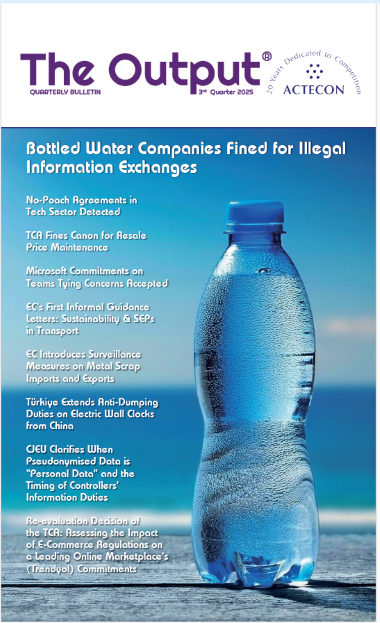LG and Its Authorized Services Cleared of Allegations: No Room for Investigation
| Competition Law

Article by Mustafa Ayna, Özlem Başıböyük Coşkun, Arda Deniz Diler and Selim Turan.
INTRODUCTION
Following a preliminary inquiry, the Turkish Competition Authority (“TCA”) decided1 not to initiate an investigation into the undertakings active in the markets for spare parts, maintenance, and repair services for mobile phones.
For the background information, upon a complaint of VINTEK, a preliminary inquiry into LG Electronics Ticaret A.Ş. (“LG”)2, Elmek Servis Satış ve Mühendislik Hizmetleri Ltd. Şti. (“ELMEK”) and Şengüller Telekomünikasyon ve Dayanıklı Tüketim Mamulleri Pazarlama A.Ş. (“ŞENGÜLLER”) was initiated 09 June 2022 to determine whether (i) LG, ELMEK, and ŞENGÜLLER had violated Article 4 of Law No. 4054 on the Protection of Competition (“Turkish Competition Law”) (equivalent of Article 101 TFEU) via collectively excluding Vintek Elektronik ve Dayanıklı Tüketim Malları Ticaret Limited Şirketi (“VİNTEK”) from the market; and whether (ii) LG had abused its dominant position via exclusionary and discriminatory practices, i.e. violated Article 6 of the Turkish Competition Law (Article 102 TFEU).
In this short article we provide you with the highlights of the decision and its reasoning. The TCA found that there was neither abuse of dominance (since the company was not dominant), nor anticompetitive practices.
The decision is important as it provides a better understanding of the TCA’s approach towards the exclusionary and discriminatory practices. Interestingly, even though the dominance of LG was not found, the TCA nevertheless decided to assess the refusal to supply allegations and discriminatory practices.
I. (Abuse of) Dominance: Not Confirmed
Analysis Regarding the Dominant Position
The TCA first analysed the existence of a dominant position within the scope of the allegations that had LG abused its dominant position. It assessed the mobile phone sales market, which was the primary market in this case. LG did not have a significant market share in the said market. Moreover, LG had decided to terminate its sales activities for mobile phones in Turkey in 2016 and its global production activities by 2021. Therefore, it was not possible to state that LG, which had no activities in Turkey in this field, was in a dominant position in the market.
In the analysis of the technical service/spare parts, maintenance, and repair services market, defined as the aftermarket, neither LG itself nor any of its subsidiaries directly operated in the market. Although LG had 12 technical services in the market as of 2022, it was determined that all these services were essentially authorized services of other brands, and they operated as LG's authorized services secondarily.
Consequently, the TCA concluded that LG was not in a dominant position in the markets concerned. Nevertheless, and interestingly, the TCA decided to examine the refusal to supply allegations.
Refusal-to-Supply Assessment – No essential facility found
In evaluating refusal to supply allegations, the existence of three conditions is sought, in particular, the refusal to supply is:
- related to a product or service that is indispensable for competition in the downstream market;
- likely to eliminate effective competition in the downstream market, and
- likely to cause the consumer harm.
Accordingly, first, the TCA examined and found that the commercial relationship with LG regarding the spare parts, maintenance, and repair services for LG mobile phones did not constitute an essential facility for VİNTEK. This is because VINTEK remains active in this field although its commercial relationship with LG ended in 2019; VİNTEK continues to provide mobile phone spare parts, maintenance, and repair services for other brands, as well as services for smart ecosystem products such as smart vacuum cleaners, smartwatches, and Bluetooth headsets; and moreover, VİNTEK was able to supply spare parts for a period through another undertaking.
The TCA held that the finding that the commercial relationship with LG for spare parts, maintenance, and repair services for LG mobile phones was not an essential facility for VİNTEK was sufficient to show that the refusal to supply had not occurred. Nevertheless, it also examined whether LG had objective justifiable grounds to terminate its commercial relationship with VINTEK. In this context, as explained, LG decided to withdraw gradually from the mobile phone market as a result of declining sales and thus it needed to work with fewer authorized services, VINTEK had a debt to LG, and a dispute exists between the parties regarding progress payments.
In light of all these considerations, the TCA concluded that LG's conduct subject to the complaint cannot be considered as a refusal to supply even if it was assumed to be in a dominant position (although it is not).
II. Was There a Discrimination? The other issue examined in the assessment of whether the abusive conduct had occurred was the allegation that LG's activities constituted discrimination. The TCA emphasized that to establish an act of discrimination under the Turkish Competition Law, (i) the purchasers must be at equal status; (ii) the same and equal rights, obligations, and acts must exist; and (iii) different terms must be offered for these same and equal rights, obligations, and acts:
- Firstly, even though LG was not in a dominant position, the TCA examined the allegations that LG had engaged in discriminatory conduct against purchasers of equal status, such as by supplying spare parts to ELMEK and ŞENGÜLLER at lower prices. In this context, it was stated that VİNTEK and ELMEK did not offer the same products and services; in other words, the undertakings in question were not at equal status and are not competitors.
- The allegation in the complaint that LG paid the receivables of ELMEK's employees after ELMEK had ceased its commercial activities also was examined. Regarding this issue, LG stated that this situation had occurred only once and that an ELMEK call centre employee had been dismissed upon allegations that he had transferred customer information to third parties and that the compensation payment to be made to the employee had been covered by LG.
- Another allegation of discrimination was that LG had discriminated in favour of ŞENGÜLLER and ELMEK by providing them cheaper with spare parts. The TCA found that the purchase prices for spare parts from LG had been substantially the same for VİNTEK and ŞENGÜLLER. In this respect, the TCA concluded that the differing pricing between different authorized services had involved a limited number of purchases and did not constitute a general practice.
- With regard to the allegation that LG distorted competition in the market for technical service/spare parts, maintenance, and repair services by forcing VİNTEK to purchase spare parts from ŞENGÜLLER, the TCA emphasized that it was LG's basic policy not to provide spare parts for all authorized services that were in debt to LG. In this respect, it was evaluated that the undertakings had been treated in a manner consistent with the obligation to treat undertakings of equal status equally.
In light of these findings, the TCA concluded that LG had not engaged in conduct that would constitute an abuse of a dominant position by way of discrimination.
III. Anticompetitive Concerted Practices Allegations Lacked Substantiation
LG, ŞENGÜLLER, and ELMEK were accused of being engaged in concerted practices to exclude VİNTEK from the market. However, the TCA stated that the complainant had not provided concrete information or documents in this regard.
The TCA also indicated that (i) ELMEK did not operate in the same market as VİNTEK and only provided a call services market, and (ii) the significant decrease in VİNTEK's business volume was related to LG's withdrawal from the relevant market in Turkey but not LG, ŞENGÜLLER, and ELMEK’s practices.
The TCA examined whether LG had interfered with the passive sales of authorized services during the relevant period. In this file, it was observed that LG had sent a notification to its authorized services requesting them not to provide service to customers outside their provinces.
Accordingly, the TCA stated that the notifications sent by LG to its authorized services had not been intended to restrict the passive sales of the authorized services. Instead, the notifications had been aimed at both ensuring that the maximum repair time in the After Sales Services Regulation3 had not been exceeded and providing faster and better-quality service to the customers by enabling the services to reach the customers in their own provinces. Another objective pursued by LG was to prevent the reflection of service and cargo costs to LG by treating products that were not under warranty as if they were under warranty.
CONCLUSION
Following the assessment of the above, the TCA rejected the allegations against LG in relation to the abuse of dominance (via refusal to deal) and discrimination. Additionally, no document or evidence indicated an anticompetitive agreement or concerted practice between LG, ELMEK, and ŞENGÜLLER. Therefore, launching of the investigation was not found necessary. What is necessary to remember is that the decision makes in-depth observations in terms of examining the exclusionary and discriminatory practices within the Turkish Competition Law.
1- Decision dated 05 January 2023 and numbered 23-01/13-8.
2- LG had been selling mobile phones in Turkey until 2016 but had ceased its activities as of that year. However, after 2016, LG continued to provide technical services under the manufacturer's warranty, as various distributors offered LG mobile phones for sale in Turkey through imports. LG currently has 12 authorized services throughout Turkey for the maintenance or repair of mobile phones. The Decision also stated that while ŞENGÜLLER provided technical service activities to LG until 2021, ELMEK has been providing call centre services to LG since 2008.
3- "After-Sales Services Regulation," published in The Official Gazette, dated 13 June 2014 and numbered 29029, regulating the procedures and principles regarding the service life of some goods, maximum repair periods, and after-sales installation, maintenance, and repair services.







